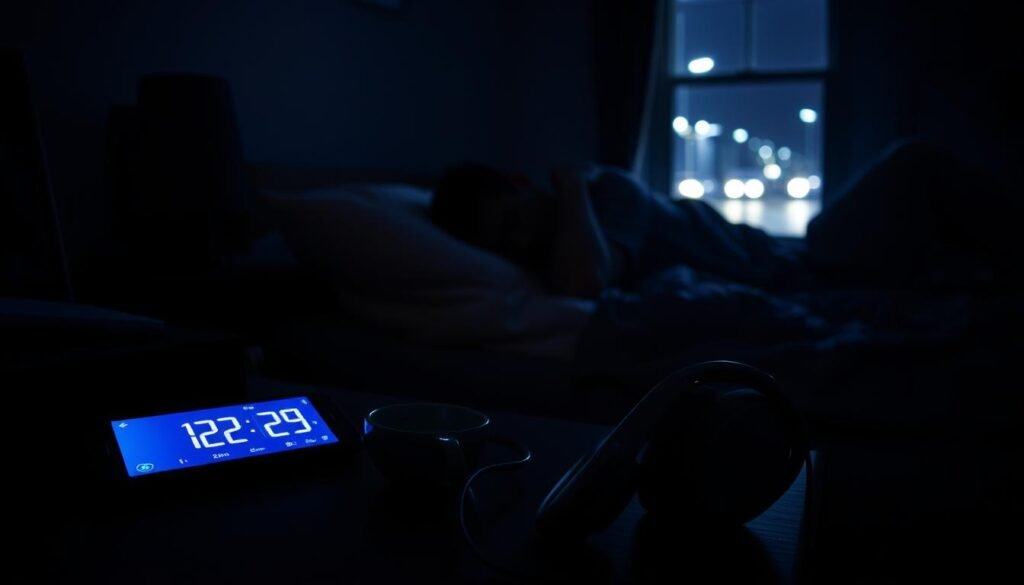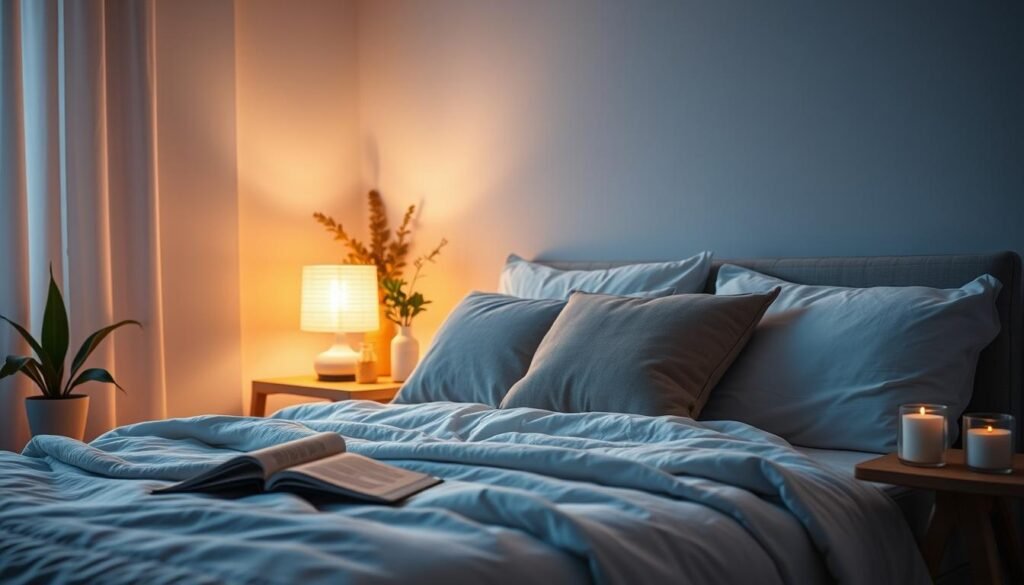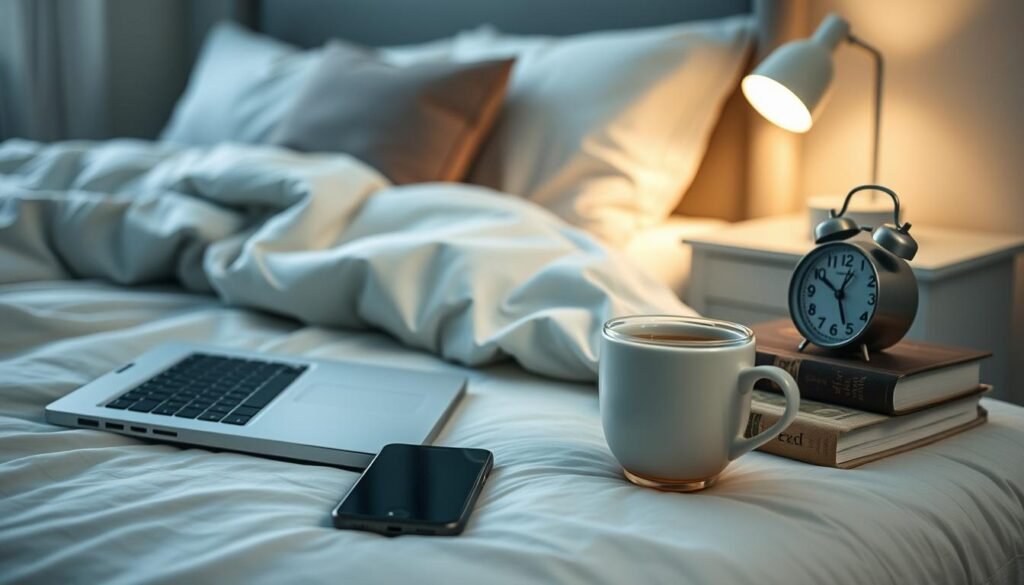About 43% of the population say they don’t get enough sleep. This fact shows the big issue of not sleeping well in our lives. Good sleep is a must for health. It helps our mind, body defense, and even weight.
To sleep well, one must avoid things that disturb sleep. We need to know what stops us from sleeping well. Caffeine, where we sleep, and our night habits can change how we sleep. Find tips on better sleep habits here.
Key Takeaways
- About 43% of people report insufficient sleep.
- Adequate sleep is vital for mental health and immune function.
- Identifying and avoiding common sleep disruptors is key to better sleep.
- Maintaining a consistent bedtime routine encourages healthy sleep habits.
- Creating a welcoming sleep environment can enhance sleep quality.
Understanding Sleep Cycles and Their Importance
Sleep involves many stages, each vital for health and happiness. Knowing about sleep cycles can make your sleep better. Normally, a sleep cycle takes between 70 to 120 minutes, moving through non-REM and REM stages. REM sleep is very important for our thinking and feelings.
The Role of REM Sleep
REM sleep takes up 10 to 60 minutes and is key for remembering and learning. Most REM sleep happens late at night. So, sleeping without waking up is very important. Not getting enough REM can affect your mind and mood.
If you wake up a lot at night, look into what’s causing it. Making your sleeping area better, sticking to a sleep schedule, and practicing good bedtime habits can help. Paying attention to sleep cycles is key for good health. Learn more about this at importance of sleep cycles.
Common Sleep Disruptors to Avoid
Understanding sleep disruptors can boost sleep quality. Caffeine and alcohol are big culprits. Knowing how they affect sleep helps us choose better habits.
Caffeine and Alcohol Consumption
Caffeine is in coffee, tea, and snacks. It keeps you awake for hours, hurting sleep. Drinking caffeine late makes it hard to sleep well. Alcohol might seem to help at first. But it actually ruins sleep later, stopping deep rest that heals the body.
Restless Leg Syndrome
Restless leg syndrome affects about 10% in the U.S. It makes people need to move their legs, which ruins sleep. Beating this issue is key for good sleep. Moderate exercise can help ease RLS symptoms, improving sleep.

Maintaining Healthy Sleep Habits
Having good sleep habits is key to our well-being. For better sleep, stick to a regular schedule. This helps our body clock run smoothly. Staying consistent with our sleep and wake times improves our sleep and makes us less tired during the day.
Importance of Regular Sleep Schedule
Sticking to the same sleep schedule every day helps our natural rhythms. This makes it easier to fall asleep and wake up feeling fresh. Keeping our bedroom cool, between 60 and 67°F, helps us relax. It’s also wise to cut back on caffeine in the afternoon and evening. Caffeine can stay in our system for hours and disrupt sleep.
Evening Activities
Doing calm activities in the evening sets us up for good sleep. Try exercising lightly a few hours before bed to relax. And avoiding screens that emit blue light helps keep our melatonin levels steady. Consider calming activities like reading or meditating before bed. To reduce stress, write down your worries or plan your next day. This can help clear your mind for sleep. To improve sleep through diet, check out these tips.
Avoiding Sleep Disruptors with Your Bedtime Routine
A good bedtime routine is key to better sleep. It helps you relax and avoid things that disturb sleep. Avoiding screens before bed improves melatonin, which we need for deep sleep. Cutting down screen time before bed helps us sleep better.
The Effect of Evening Screen Time
Studies show that using screens before sleeping cuts down on sleep quality and time. The blue light from screens lowers melatonin, making it hard to sleep. Having no tech before bed helps prepare us for sleep. Reducing evening screen time boosts melatonin and helps our body’s clock. Try a digital curfew to sleep better. To learn more about screen time and sleep, visit screen time impacts on sleep.
Pre-sleep Activities
Doing calming activities before bed helps signal our body it’s time to sleep. Relaxing by reading, meditating, or doing gentle stretches improves bedtime routines. Stay away from activities that wake you up, like intense workouts or work tasks. Keep your bedroom cool, between 60-67°F, for the best sleep. With the right activities before bed, you can dodge sleep disruptors.

Screen Time Reduction for Better Sleep Quality
Excessive screen time, especially before bed, can ruin your sleep. Electronic devices emit blue light, which messes with your sleep cycle. This makes falling asleep hard. Around 75% of kids and 70% of adults use devices in bed, harming sleep quality.
Effects of Blue Light
In homes with about five devices, blue light is a big problem. To sleep better, try these tips:
- Removing electronic devices from the bedroom
- Setting consistent “screens off” and “lights out” times
- Adopting relaxation techniques before bedtime
- Creating a dedicated space for electronics outside the bedroom
Limiting device use before bed can help fight blue light’s bad effects. Not using screens an hour before bed is a good start. It sets a healthy nighttime routine:
- Reduce the number of devices in the bedroom
- Put devices in a drawer to limit temptation
- Silence notifications to avoid distractions
- Resist the urge to check devices when waking up at night
Turn down screen brightness and wear blue light glasses to ease blue light’s impact. Regular use of devices links to bad sleep. Smart screen time management promotes restful sleep.

| Age Group | Device Use Pre-Bedtime | Poor Sleep Quality (%) |
|---|---|---|
| Toddlers | 30% | Low Sleep Quality |
| Preschoolers | 30% | Low Sleep Quality |
| School-age Children | 60% | 28% |
| Teenagers | 57% | Moderate to Severe Sleepiness |
Creating an Optimal Sleep Environment
Making your bedroom perfect for sleep is key to cutting down on sleep problems. Small but smart changes can greatly improve how well you sleep. Things like how warm or cool your room is, how much light gets in, and the level of noise can make or break a restful night. So, it’s wise to make several tweaks to ensure your sleeping space is just right.
Sleep-Friendly Adjustments
Making the right changes in your bedroom can boost your sleep quality. Here are some top tips to make your bedroom better for sleeping:
- Maintain a bedroom temperature between 60 and 67 degrees Fahrenheit to encourage restful sleep.
- Use blackout curtains to eliminate light pollution, thereby fostering a dark and inviting space.
- Integrate white noise machines or calming nature sounds to drown out disruptive noises.
- Choose calming colors for the bedroom walls, such as blue, yellow, or green, which are often linked to better sleep.
- Replace pillows every 1 to 2 years to ensure optimal support and comfort.
By making these changes, you can turn your bedroom into the ideal spot for deep sleep. Following these steps will help you cut down on sleep problems. This way, you get to enjoy a peaceful night every time. It turns your bedroom into a sanctuary for sleep.
Relaxation Techniques to Enhance Sleep Hygiene
Making relaxation a nightly habit is key for better sleep. Stress is a big blocker of good sleep. Studies reveal that 44 percent of adults have slept poorly due to stress in the last month. Using mindfulness, like deep breaths and yoga, helps calm anxiety and gets your mind ready for sleep.
Mindfulness and Deep Breathing
Practicing mindfulness brings peace and triggers relaxation in the body. If you do deep breathing or muscle relaxation for 20-25 minutes a day, you’ll start feeling calmer in two weeks. These relaxation techniques cut down stress hormones, helping you sleep better.
Herbal teas can also help with sleep. Chamomile tea, for example, is known for its soothing effects. Lemon balm and rooibos teas have unique benefits for sleep too. Adding these to your night routine can mean less tossing and turning, improving your overall health.
Insomnia Prevention: Managing Stress and Anxiety
Many people face insomnia due to high stress and anxiety. Around one-third of adults deal with it at some point. This issue often leads to difficulties during the day. Stress can cut short deep sleep and upset REM sleep. This starts a cycle of sleepless nights. To prevent insomnia, it’s key to manage stress well. This boosts sleep quality.
Cognitive Behavioral Techniques
Cognitive-behavioral therapy (CBT) is useful against stress-induced insomnia. CBT changes negative thoughts and feelings. It solves problems before they worsen at night. Including journaling in your routine clears your mind. It helps manage worries of the day. Progressive muscle relaxation is another method to get ready for sleep.
Finding out what causes your stress is the first step to tackle it. Knowing your stress triggers helps handle them better. Sudden issues like troubles in relationships or work stress can cause short-term insomnia. Long-term stress often leads to chronic insomnia. Stress hormones make you too alert at night. This makes it hard to relax and sleep.
Daily habits to relieve stress can greatly improve your life. Regular exercise eases anxiety and helps you sleep better. Having friends to support you and practicing mindfulness are key. These habits can help prevent insomnia by keeping you calm.
For more tips on stress management, visit this link on how to reduce stress.
Conclusion
Understanding how to fix sleep problems is crucial for better sleep habits. Not getting enough sleep can hurt your daily life and health in the long run. It can even make you gain weight and lead to sleep issues. By drinking less caffeine and alcohol, eating well, and making your sleeping area comfortable, you can sleep better.
Sleep hygiene is very important. Making small changes to what you eat and your nighttime routine can make your sleep better. Eating foods that are rich in tryptophan and not eating a lot before bed can help you sleep calmly. When you make sleep a priority and follow helpful tips, you will develop better sleep habits and enjoy life more.
Finally, it’s important to know how your lifestyle affects your sleep. When you deal with things that keep you from sleeping well, you can sleep more soundly. Improving your sleep does not only make you rest better but also improves your overall health. This shows how crucial it is to focus on sleeping well every day.